Critical Analysis: Big Brother Nigeria's Influence on Alcohol Use
VerifiedAdded on 2022/03/10
|6
|2911
|17
Report
AI Summary
This report critically examines the influence of the Big Brother Nigeria (BBN) TV show on the alcohol consumption habits of its audience, particularly Nigerian youth. The study employed a quantitative research design, utilizing survey questionnaires to gather data on audience perceptions and ...
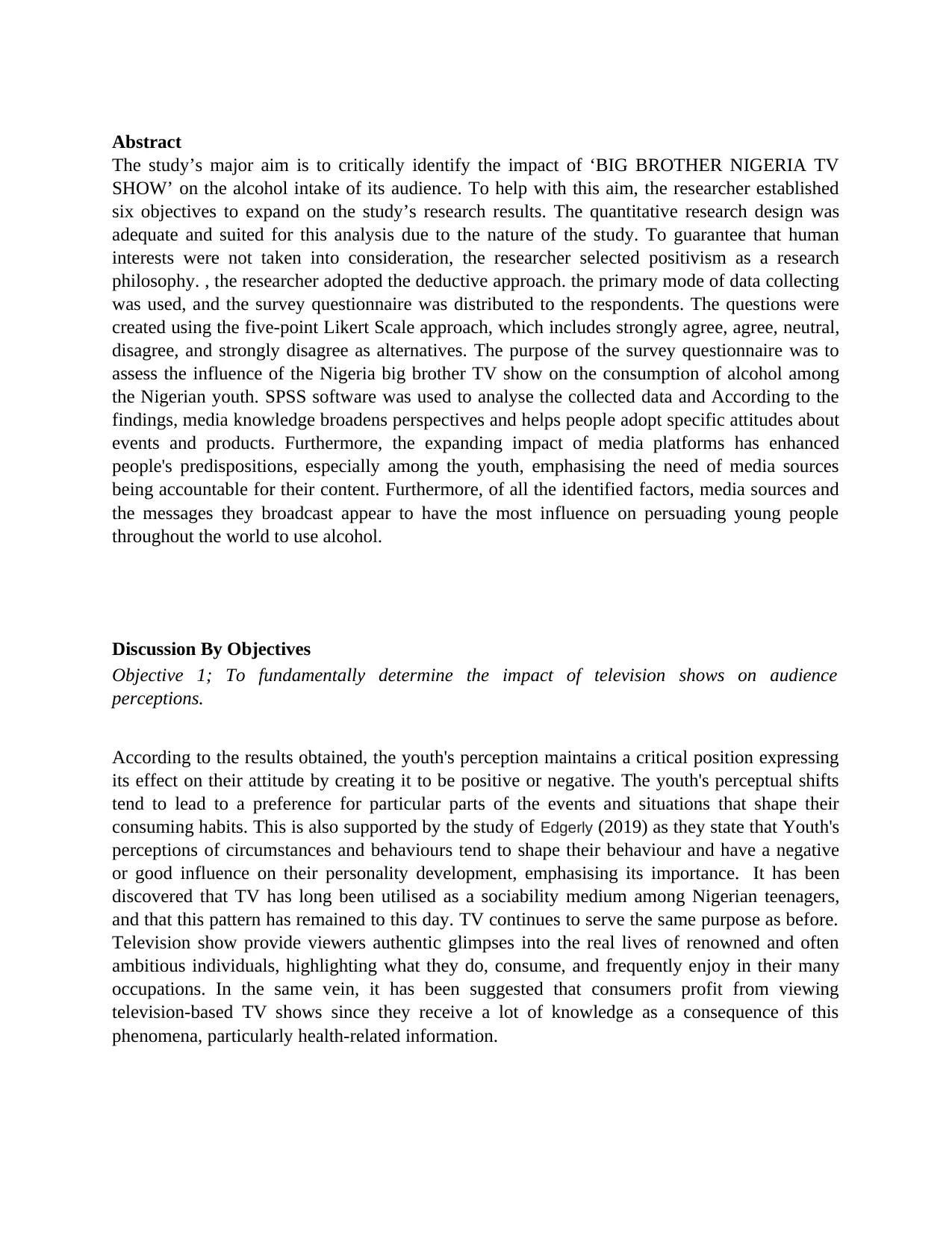
Abstract
The study’s major aim is to critically identify the impact of ‘BIG BROTHER NIGERIA TV
SHOW’ on the alcohol intake of its audience. To help with this aim, the researcher established
six objectives to expand on the study’s research results. The quantitative research design was
adequate and suited for this analysis due to the nature of the study. To guarantee that human
interests were not taken into consideration, the researcher selected positivism as a research
philosophy. , the researcher adopted the deductive approach. the primary mode of data collecting
was used, and the survey questionnaire was distributed to the respondents. The questions were
created using the five-point Likert Scale approach, which includes strongly agree, agree, neutral,
disagree, and strongly disagree as alternatives. The purpose of the survey questionnaire was to
assess the influence of the Nigeria big brother TV show on the consumption of alcohol among
the Nigerian youth. SPSS software was used to analyse the collected data and According to the
findings, media knowledge broadens perspectives and helps people adopt specific attitudes about
events and products. Furthermore, the expanding impact of media platforms has enhanced
people's predispositions, especially among the youth, emphasising the need of media sources
being accountable for their content. Furthermore, of all the identified factors, media sources and
the messages they broadcast appear to have the most influence on persuading young people
throughout the world to use alcohol.
Discussion By Objectives
Objective 1; To fundamentally determine the impact of television shows on audience
perceptions.
According to the results obtained, the youth's perception maintains a critical position expressing
its effect on their attitude by creating it to be positive or negative. The youth's perceptual shifts
tend to lead to a preference for particular parts of the events and situations that shape their
consuming habits. This is also supported by the study of Edgerly (2019) as they state that Youth's
perceptions of circumstances and behaviours tend to shape their behaviour and have a negative
or good influence on their personality development, emphasising its importance. It has been
discovered that TV has long been utilised as a sociability medium among Nigerian teenagers,
and that this pattern has remained to this day. TV continues to serve the same purpose as before.
Television show provide viewers authentic glimpses into the real lives of renowned and often
ambitious individuals, highlighting what they do, consume, and frequently enjoy in their many
occupations. In the same vein, it has been suggested that consumers profit from viewing
television-based TV shows since they receive a lot of knowledge as a consequence of this
phenomena, particularly health-related information.
The study’s major aim is to critically identify the impact of ‘BIG BROTHER NIGERIA TV
SHOW’ on the alcohol intake of its audience. To help with this aim, the researcher established
six objectives to expand on the study’s research results. The quantitative research design was
adequate and suited for this analysis due to the nature of the study. To guarantee that human
interests were not taken into consideration, the researcher selected positivism as a research
philosophy. , the researcher adopted the deductive approach. the primary mode of data collecting
was used, and the survey questionnaire was distributed to the respondents. The questions were
created using the five-point Likert Scale approach, which includes strongly agree, agree, neutral,
disagree, and strongly disagree as alternatives. The purpose of the survey questionnaire was to
assess the influence of the Nigeria big brother TV show on the consumption of alcohol among
the Nigerian youth. SPSS software was used to analyse the collected data and According to the
findings, media knowledge broadens perspectives and helps people adopt specific attitudes about
events and products. Furthermore, the expanding impact of media platforms has enhanced
people's predispositions, especially among the youth, emphasising the need of media sources
being accountable for their content. Furthermore, of all the identified factors, media sources and
the messages they broadcast appear to have the most influence on persuading young people
throughout the world to use alcohol.
Discussion By Objectives
Objective 1; To fundamentally determine the impact of television shows on audience
perceptions.
According to the results obtained, the youth's perception maintains a critical position expressing
its effect on their attitude by creating it to be positive or negative. The youth's perceptual shifts
tend to lead to a preference for particular parts of the events and situations that shape their
consuming habits. This is also supported by the study of Edgerly (2019) as they state that Youth's
perceptions of circumstances and behaviours tend to shape their behaviour and have a negative
or good influence on their personality development, emphasising its importance. It has been
discovered that TV has long been utilised as a sociability medium among Nigerian teenagers,
and that this pattern has remained to this day. TV continues to serve the same purpose as before.
Television show provide viewers authentic glimpses into the real lives of renowned and often
ambitious individuals, highlighting what they do, consume, and frequently enjoy in their many
occupations. In the same vein, it has been suggested that consumers profit from viewing
television-based TV shows since they receive a lot of knowledge as a consequence of this
phenomena, particularly health-related information.
Paraphrase This Document
Need a fresh take? Get an instant paraphrase of this document with our AI Paraphraser
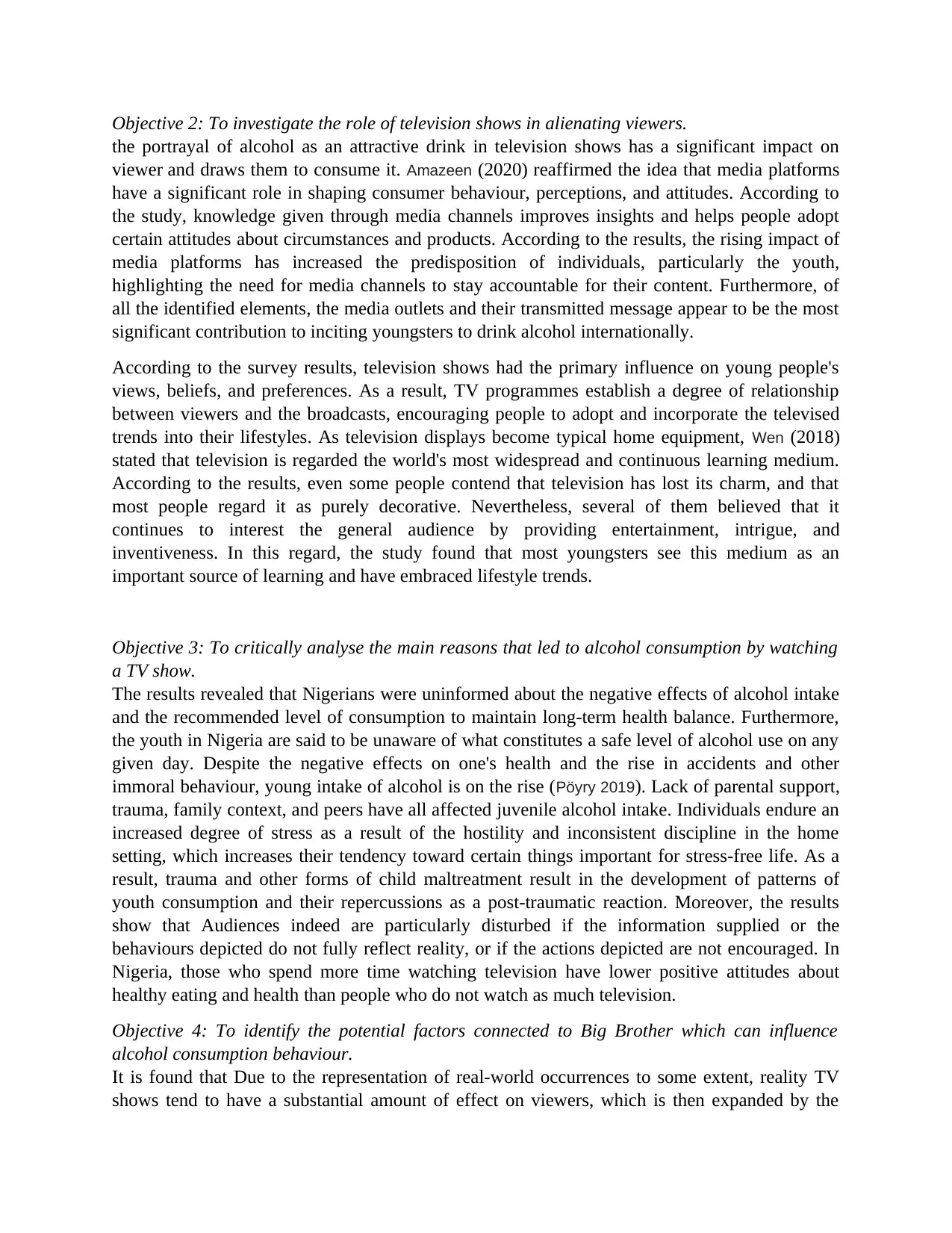
Objective 2: To investigate the role of television shows in alienating viewers.
the portrayal of alcohol as an attractive drink in television shows has a significant impact on
viewer and draws them to consume it. Amazeen (2020) reaffirmed the idea that media platforms
have a significant role in shaping consumer behaviour, perceptions, and attitudes. According to
the study, knowledge given through media channels improves insights and helps people adopt
certain attitudes about circumstances and products. According to the results, the rising impact of
media platforms has increased the predisposition of individuals, particularly the youth,
highlighting the need for media channels to stay accountable for their content. Furthermore, of
all the identified elements, the media outlets and their transmitted message appear to be the most
significant contribution to inciting youngsters to drink alcohol internationally.
According to the survey results, television shows had the primary influence on young people's
views, beliefs, and preferences. As a result, TV programmes establish a degree of relationship
between viewers and the broadcasts, encouraging people to adopt and incorporate the televised
trends into their lifestyles. As television displays become typical home equipment, Wen (2018)
stated that television is regarded the world's most widespread and continuous learning medium.
According to the results, even some people contend that television has lost its charm, and that
most people regard it as purely decorative. Nevertheless, several of them believed that it
continues to interest the general audience by providing entertainment, intrigue, and
inventiveness. In this regard, the study found that most youngsters see this medium as an
important source of learning and have embraced lifestyle trends.
Objective 3: To critically analyse the main reasons that led to alcohol consumption by watching
a TV show.
The results revealed that Nigerians were uninformed about the negative effects of alcohol intake
and the recommended level of consumption to maintain long-term health balance. Furthermore,
the youth in Nigeria are said to be unaware of what constitutes a safe level of alcohol use on any
given day. Despite the negative effects on one's health and the rise in accidents and other
immoral behaviour, young intake of alcohol is on the rise (Pöyry 2019). Lack of parental support,
trauma, family context, and peers have all affected juvenile alcohol intake. Individuals endure an
increased degree of stress as a result of the hostility and inconsistent discipline in the home
setting, which increases their tendency toward certain things important for stress-free life. As a
result, trauma and other forms of child maltreatment result in the development of patterns of
youth consumption and their repercussions as a post-traumatic reaction. Moreover, the results
show that Audiences indeed are particularly disturbed if the information supplied or the
behaviours depicted do not fully reflect reality, or if the actions depicted are not encouraged. In
Nigeria, those who spend more time watching television have lower positive attitudes about
healthy eating and health than people who do not watch as much television.
Objective 4: To identify the potential factors connected to Big Brother which can influence
alcohol consumption behaviour.
It is found that Due to the representation of real-world occurrences to some extent, reality TV
shows tend to have a substantial amount of effect on viewers, which is then expanded by the
the portrayal of alcohol as an attractive drink in television shows has a significant impact on
viewer and draws them to consume it. Amazeen (2020) reaffirmed the idea that media platforms
have a significant role in shaping consumer behaviour, perceptions, and attitudes. According to
the study, knowledge given through media channels improves insights and helps people adopt
certain attitudes about circumstances and products. According to the results, the rising impact of
media platforms has increased the predisposition of individuals, particularly the youth,
highlighting the need for media channels to stay accountable for their content. Furthermore, of
all the identified elements, the media outlets and their transmitted message appear to be the most
significant contribution to inciting youngsters to drink alcohol internationally.
According to the survey results, television shows had the primary influence on young people's
views, beliefs, and preferences. As a result, TV programmes establish a degree of relationship
between viewers and the broadcasts, encouraging people to adopt and incorporate the televised
trends into their lifestyles. As television displays become typical home equipment, Wen (2018)
stated that television is regarded the world's most widespread and continuous learning medium.
According to the results, even some people contend that television has lost its charm, and that
most people regard it as purely decorative. Nevertheless, several of them believed that it
continues to interest the general audience by providing entertainment, intrigue, and
inventiveness. In this regard, the study found that most youngsters see this medium as an
important source of learning and have embraced lifestyle trends.
Objective 3: To critically analyse the main reasons that led to alcohol consumption by watching
a TV show.
The results revealed that Nigerians were uninformed about the negative effects of alcohol intake
and the recommended level of consumption to maintain long-term health balance. Furthermore,
the youth in Nigeria are said to be unaware of what constitutes a safe level of alcohol use on any
given day. Despite the negative effects on one's health and the rise in accidents and other
immoral behaviour, young intake of alcohol is on the rise (Pöyry 2019). Lack of parental support,
trauma, family context, and peers have all affected juvenile alcohol intake. Individuals endure an
increased degree of stress as a result of the hostility and inconsistent discipline in the home
setting, which increases their tendency toward certain things important for stress-free life. As a
result, trauma and other forms of child maltreatment result in the development of patterns of
youth consumption and their repercussions as a post-traumatic reaction. Moreover, the results
show that Audiences indeed are particularly disturbed if the information supplied or the
behaviours depicted do not fully reflect reality, or if the actions depicted are not encouraged. In
Nigeria, those who spend more time watching television have lower positive attitudes about
healthy eating and health than people who do not watch as much television.
Objective 4: To identify the potential factors connected to Big Brother which can influence
alcohol consumption behaviour.
It is found that Due to the representation of real-world occurrences to some extent, reality TV
shows tend to have a substantial amount of effect on viewers, which is then expanded by the
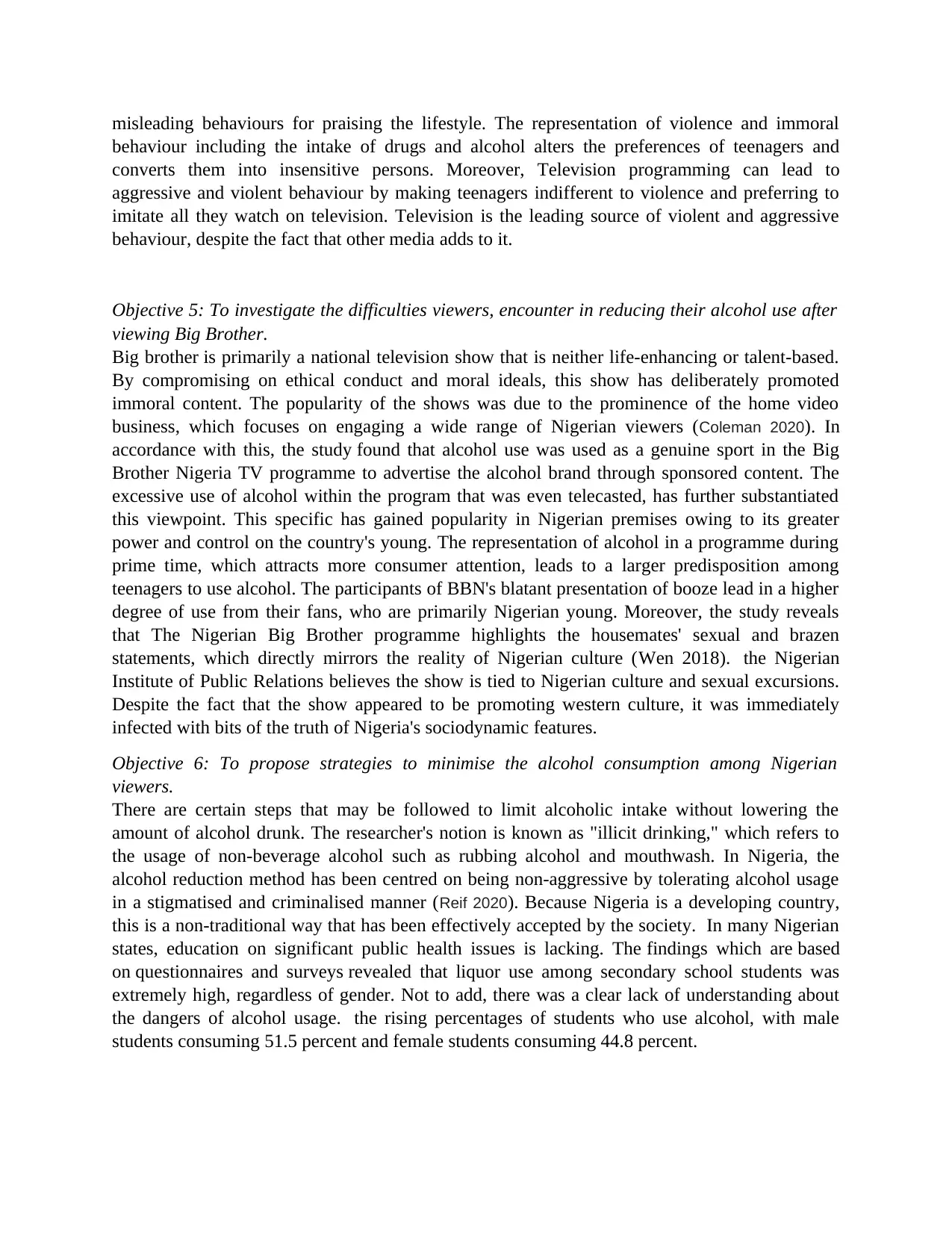
misleading behaviours for praising the lifestyle. The representation of violence and immoral
behaviour including the intake of drugs and alcohol alters the preferences of teenagers and
converts them into insensitive persons. Moreover, Television programming can lead to
aggressive and violent behaviour by making teenagers indifferent to violence and preferring to
imitate all they watch on television. Television is the leading source of violent and aggressive
behaviour, despite the fact that other media adds to it.
Objective 5: To investigate the difficulties viewers, encounter in reducing their alcohol use after
viewing Big Brother.
Big brother is primarily a national television show that is neither life-enhancing or talent-based.
By compromising on ethical conduct and moral ideals, this show has deliberately promoted
immoral content. The popularity of the shows was due to the prominence of the home video
business, which focuses on engaging a wide range of Nigerian viewers (Coleman 2020). In
accordance with this, the study found that alcohol use was used as a genuine sport in the Big
Brother Nigeria TV programme to advertise the alcohol brand through sponsored content. The
excessive use of alcohol within the program that was even telecasted, has further substantiated
this viewpoint. This specific has gained popularity in Nigerian premises owing to its greater
power and control on the country's young. The representation of alcohol in a programme during
prime time, which attracts more consumer attention, leads to a larger predisposition among
teenagers to use alcohol. The participants of BBN's blatant presentation of booze lead in a higher
degree of use from their fans, who are primarily Nigerian young. Moreover, the study reveals
that The Nigerian Big Brother programme highlights the housemates' sexual and brazen
statements, which directly mirrors the reality of Nigerian culture (Wen 2018). the Nigerian
Institute of Public Relations believes the show is tied to Nigerian culture and sexual excursions.
Despite the fact that the show appeared to be promoting western culture, it was immediately
infected with bits of the truth of Nigeria's sociodynamic features.
Objective 6: To propose strategies to minimise the alcohol consumption among Nigerian
viewers.
There are certain steps that may be followed to limit alcoholic intake without lowering the
amount of alcohol drunk. The researcher's notion is known as "illicit drinking," which refers to
the usage of non-beverage alcohol such as rubbing alcohol and mouthwash. In Nigeria, the
alcohol reduction method has been centred on being non-aggressive by tolerating alcohol usage
in a stigmatised and criminalised manner (Reif 2020). Because Nigeria is a developing country,
this is a non-traditional way that has been effectively accepted by the society. In many Nigerian
states, education on significant public health issues is lacking. The findings which are based
on questionnaires and surveys revealed that liquor use among secondary school students was
extremely high, regardless of gender. Not to add, there was a clear lack of understanding about
the dangers of alcohol usage. the rising percentages of students who use alcohol, with male
students consuming 51.5 percent and female students consuming 44.8 percent.
behaviour including the intake of drugs and alcohol alters the preferences of teenagers and
converts them into insensitive persons. Moreover, Television programming can lead to
aggressive and violent behaviour by making teenagers indifferent to violence and preferring to
imitate all they watch on television. Television is the leading source of violent and aggressive
behaviour, despite the fact that other media adds to it.
Objective 5: To investigate the difficulties viewers, encounter in reducing their alcohol use after
viewing Big Brother.
Big brother is primarily a national television show that is neither life-enhancing or talent-based.
By compromising on ethical conduct and moral ideals, this show has deliberately promoted
immoral content. The popularity of the shows was due to the prominence of the home video
business, which focuses on engaging a wide range of Nigerian viewers (Coleman 2020). In
accordance with this, the study found that alcohol use was used as a genuine sport in the Big
Brother Nigeria TV programme to advertise the alcohol brand through sponsored content. The
excessive use of alcohol within the program that was even telecasted, has further substantiated
this viewpoint. This specific has gained popularity in Nigerian premises owing to its greater
power and control on the country's young. The representation of alcohol in a programme during
prime time, which attracts more consumer attention, leads to a larger predisposition among
teenagers to use alcohol. The participants of BBN's blatant presentation of booze lead in a higher
degree of use from their fans, who are primarily Nigerian young. Moreover, the study reveals
that The Nigerian Big Brother programme highlights the housemates' sexual and brazen
statements, which directly mirrors the reality of Nigerian culture (Wen 2018). the Nigerian
Institute of Public Relations believes the show is tied to Nigerian culture and sexual excursions.
Despite the fact that the show appeared to be promoting western culture, it was immediately
infected with bits of the truth of Nigeria's sociodynamic features.
Objective 6: To propose strategies to minimise the alcohol consumption among Nigerian
viewers.
There are certain steps that may be followed to limit alcoholic intake without lowering the
amount of alcohol drunk. The researcher's notion is known as "illicit drinking," which refers to
the usage of non-beverage alcohol such as rubbing alcohol and mouthwash. In Nigeria, the
alcohol reduction method has been centred on being non-aggressive by tolerating alcohol usage
in a stigmatised and criminalised manner (Reif 2020). Because Nigeria is a developing country,
this is a non-traditional way that has been effectively accepted by the society. In many Nigerian
states, education on significant public health issues is lacking. The findings which are based
on questionnaires and surveys revealed that liquor use among secondary school students was
extremely high, regardless of gender. Not to add, there was a clear lack of understanding about
the dangers of alcohol usage. the rising percentages of students who use alcohol, with male
students consuming 51.5 percent and female students consuming 44.8 percent.
You're viewing a preview
Unlock full access by subscribing today!
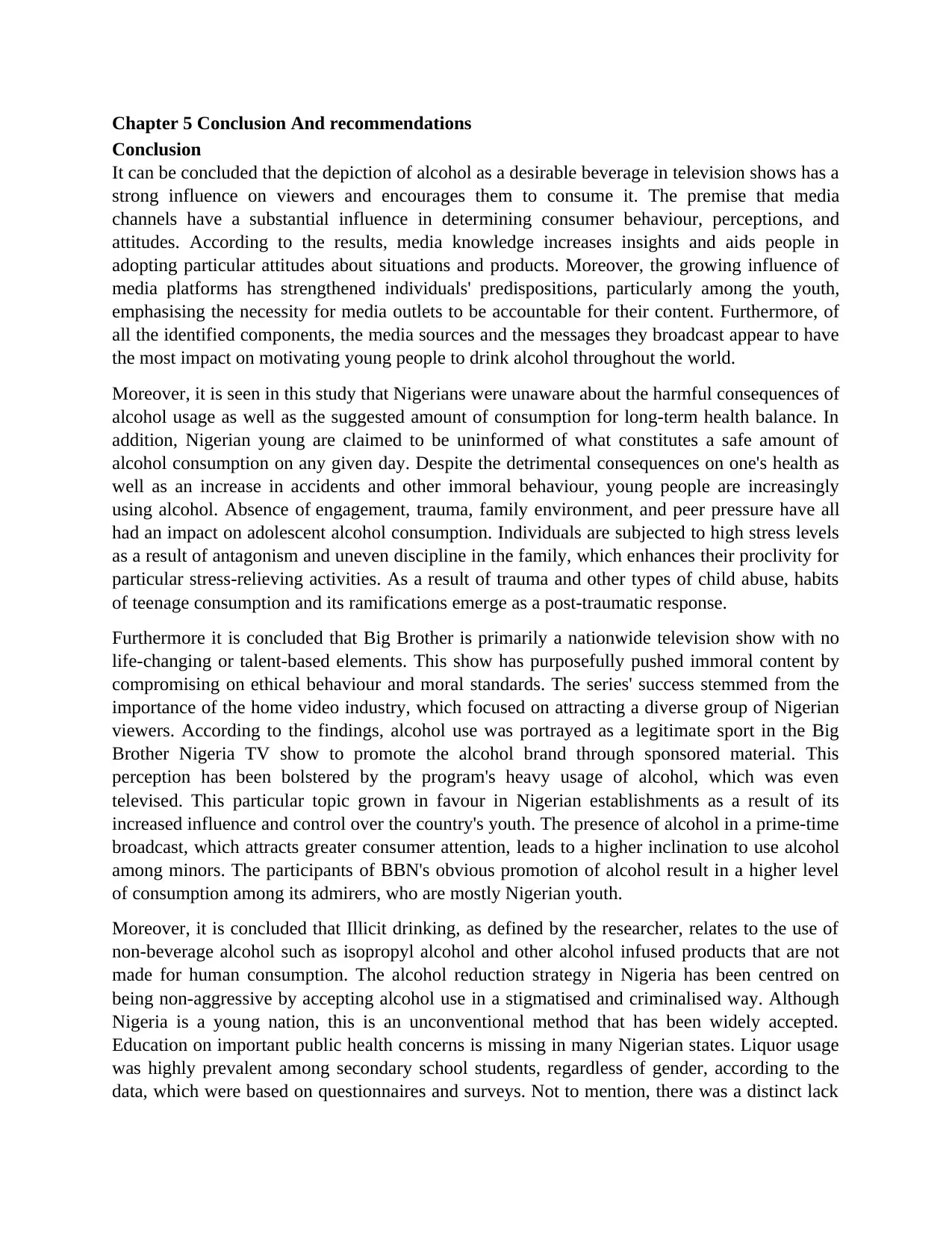
Chapter 5 Conclusion And recommendations
Conclusion
It can be concluded that the depiction of alcohol as a desirable beverage in television shows has a
strong influence on viewers and encourages them to consume it. The premise that media
channels have a substantial influence in determining consumer behaviour, perceptions, and
attitudes. According to the results, media knowledge increases insights and aids people in
adopting particular attitudes about situations and products. Moreover, the growing influence of
media platforms has strengthened individuals' predispositions, particularly among the youth,
emphasising the necessity for media outlets to be accountable for their content. Furthermore, of
all the identified components, the media sources and the messages they broadcast appear to have
the most impact on motivating young people to drink alcohol throughout the world.
Moreover, it is seen in this study that Nigerians were unaware about the harmful consequences of
alcohol usage as well as the suggested amount of consumption for long-term health balance. In
addition, Nigerian young are claimed to be uninformed of what constitutes a safe amount of
alcohol consumption on any given day. Despite the detrimental consequences on one's health as
well as an increase in accidents and other immoral behaviour, young people are increasingly
using alcohol. Absence of engagement, trauma, family environment, and peer pressure have all
had an impact on adolescent alcohol consumption. Individuals are subjected to high stress levels
as a result of antagonism and uneven discipline in the family, which enhances their proclivity for
particular stress-relieving activities. As a result of trauma and other types of child abuse, habits
of teenage consumption and its ramifications emerge as a post-traumatic response.
Furthermore it is concluded that Big Brother is primarily a nationwide television show with no
life-changing or talent-based elements. This show has purposefully pushed immoral content by
compromising on ethical behaviour and moral standards. The series' success stemmed from the
importance of the home video industry, which focused on attracting a diverse group of Nigerian
viewers. According to the findings, alcohol use was portrayed as a legitimate sport in the Big
Brother Nigeria TV show to promote the alcohol brand through sponsored material. This
perception has been bolstered by the program's heavy usage of alcohol, which was even
televised. This particular topic grown in favour in Nigerian establishments as a result of its
increased influence and control over the country's youth. The presence of alcohol in a prime-time
broadcast, which attracts greater consumer attention, leads to a higher inclination to use alcohol
among minors. The participants of BBN's obvious promotion of alcohol result in a higher level
of consumption among its admirers, who are mostly Nigerian youth.
Moreover, it is concluded that Illicit drinking, as defined by the researcher, relates to the use of
non-beverage alcohol such as isopropyl alcohol and other alcohol infused products that are not
made for human consumption. The alcohol reduction strategy in Nigeria has been centred on
being non-aggressive by accepting alcohol use in a stigmatised and criminalised way. Although
Nigeria is a young nation, this is an unconventional method that has been widely accepted.
Education on important public health concerns is missing in many Nigerian states. Liquor usage
was highly prevalent among secondary school students, regardless of gender, according to the
data, which were based on questionnaires and surveys. Not to mention, there was a distinct lack
Conclusion
It can be concluded that the depiction of alcohol as a desirable beverage in television shows has a
strong influence on viewers and encourages them to consume it. The premise that media
channels have a substantial influence in determining consumer behaviour, perceptions, and
attitudes. According to the results, media knowledge increases insights and aids people in
adopting particular attitudes about situations and products. Moreover, the growing influence of
media platforms has strengthened individuals' predispositions, particularly among the youth,
emphasising the necessity for media outlets to be accountable for their content. Furthermore, of
all the identified components, the media sources and the messages they broadcast appear to have
the most impact on motivating young people to drink alcohol throughout the world.
Moreover, it is seen in this study that Nigerians were unaware about the harmful consequences of
alcohol usage as well as the suggested amount of consumption for long-term health balance. In
addition, Nigerian young are claimed to be uninformed of what constitutes a safe amount of
alcohol consumption on any given day. Despite the detrimental consequences on one's health as
well as an increase in accidents and other immoral behaviour, young people are increasingly
using alcohol. Absence of engagement, trauma, family environment, and peer pressure have all
had an impact on adolescent alcohol consumption. Individuals are subjected to high stress levels
as a result of antagonism and uneven discipline in the family, which enhances their proclivity for
particular stress-relieving activities. As a result of trauma and other types of child abuse, habits
of teenage consumption and its ramifications emerge as a post-traumatic response.
Furthermore it is concluded that Big Brother is primarily a nationwide television show with no
life-changing or talent-based elements. This show has purposefully pushed immoral content by
compromising on ethical behaviour and moral standards. The series' success stemmed from the
importance of the home video industry, which focused on attracting a diverse group of Nigerian
viewers. According to the findings, alcohol use was portrayed as a legitimate sport in the Big
Brother Nigeria TV show to promote the alcohol brand through sponsored material. This
perception has been bolstered by the program's heavy usage of alcohol, which was even
televised. This particular topic grown in favour in Nigerian establishments as a result of its
increased influence and control over the country's youth. The presence of alcohol in a prime-time
broadcast, which attracts greater consumer attention, leads to a higher inclination to use alcohol
among minors. The participants of BBN's obvious promotion of alcohol result in a higher level
of consumption among its admirers, who are mostly Nigerian youth.
Moreover, it is concluded that Illicit drinking, as defined by the researcher, relates to the use of
non-beverage alcohol such as isopropyl alcohol and other alcohol infused products that are not
made for human consumption. The alcohol reduction strategy in Nigeria has been centred on
being non-aggressive by accepting alcohol use in a stigmatised and criminalised way. Although
Nigeria is a young nation, this is an unconventional method that has been widely accepted.
Education on important public health concerns is missing in many Nigerian states. Liquor usage
was highly prevalent among secondary school students, regardless of gender, according to the
data, which were based on questionnaires and surveys. Not to mention, there was a distinct lack
Paraphrase This Document
Need a fresh take? Get an instant paraphrase of this document with our AI Paraphraser
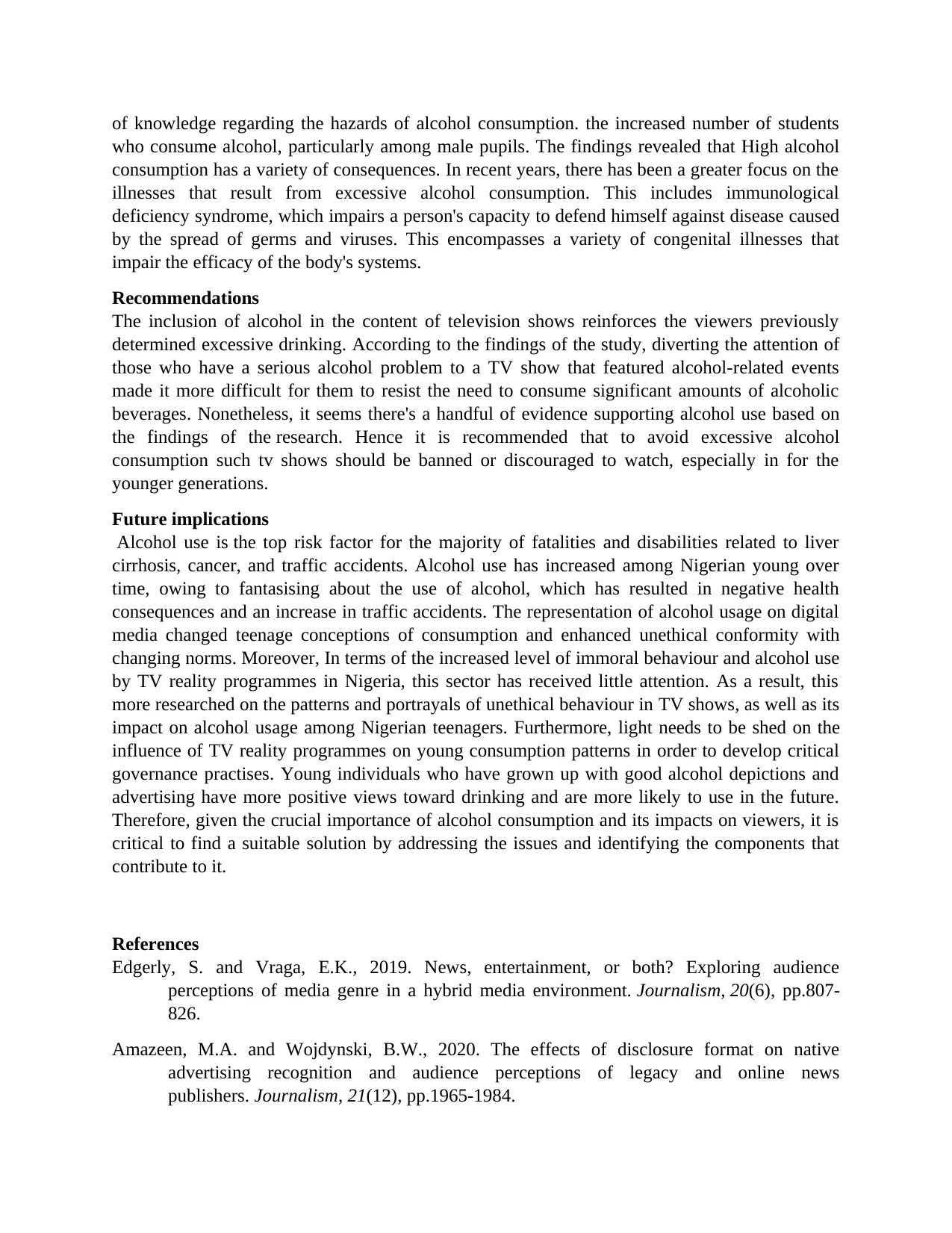
of knowledge regarding the hazards of alcohol consumption. the increased number of students
who consume alcohol, particularly among male pupils. The findings revealed that High alcohol
consumption has a variety of consequences. In recent years, there has been a greater focus on the
illnesses that result from excessive alcohol consumption. This includes immunological
deficiency syndrome, which impairs a person's capacity to defend himself against disease caused
by the spread of germs and viruses. This encompasses a variety of congenital illnesses that
impair the efficacy of the body's systems.
Recommendations
The inclusion of alcohol in the content of television shows reinforces the viewers previously
determined excessive drinking. According to the findings of the study, diverting the attention of
those who have a serious alcohol problem to a TV show that featured alcohol-related events
made it more difficult for them to resist the need to consume significant amounts of alcoholic
beverages. Nonetheless, it seems there's a handful of evidence supporting alcohol use based on
the findings of the research. Hence it is recommended that to avoid excessive alcohol
consumption such tv shows should be banned or discouraged to watch, especially in for the
younger generations.
Future implications
Alcohol use is the top risk factor for the majority of fatalities and disabilities related to liver
cirrhosis, cancer, and traffic accidents. Alcohol use has increased among Nigerian young over
time, owing to fantasising about the use of alcohol, which has resulted in negative health
consequences and an increase in traffic accidents. The representation of alcohol usage on digital
media changed teenage conceptions of consumption and enhanced unethical conformity with
changing norms. Moreover, In terms of the increased level of immoral behaviour and alcohol use
by TV reality programmes in Nigeria, this sector has received little attention. As a result, this
more researched on the patterns and portrayals of unethical behaviour in TV shows, as well as its
impact on alcohol usage among Nigerian teenagers. Furthermore, light needs to be shed on the
influence of TV reality programmes on young consumption patterns in order to develop critical
governance practises. Young individuals who have grown up with good alcohol depictions and
advertising have more positive views toward drinking and are more likely to use in the future.
Therefore, given the crucial importance of alcohol consumption and its impacts on viewers, it is
critical to find a suitable solution by addressing the issues and identifying the components that
contribute to it.
References
Edgerly, S. and Vraga, E.K., 2019. News, entertainment, or both? Exploring audience
perceptions of media genre in a hybrid media environment. Journalism, 20(6), pp.807-
826.
Amazeen, M.A. and Wojdynski, B.W., 2020. The effects of disclosure format on native
advertising recognition and audience perceptions of legacy and online news
publishers. Journalism, 21(12), pp.1965-1984.
who consume alcohol, particularly among male pupils. The findings revealed that High alcohol
consumption has a variety of consequences. In recent years, there has been a greater focus on the
illnesses that result from excessive alcohol consumption. This includes immunological
deficiency syndrome, which impairs a person's capacity to defend himself against disease caused
by the spread of germs and viruses. This encompasses a variety of congenital illnesses that
impair the efficacy of the body's systems.
Recommendations
The inclusion of alcohol in the content of television shows reinforces the viewers previously
determined excessive drinking. According to the findings of the study, diverting the attention of
those who have a serious alcohol problem to a TV show that featured alcohol-related events
made it more difficult for them to resist the need to consume significant amounts of alcoholic
beverages. Nonetheless, it seems there's a handful of evidence supporting alcohol use based on
the findings of the research. Hence it is recommended that to avoid excessive alcohol
consumption such tv shows should be banned or discouraged to watch, especially in for the
younger generations.
Future implications
Alcohol use is the top risk factor for the majority of fatalities and disabilities related to liver
cirrhosis, cancer, and traffic accidents. Alcohol use has increased among Nigerian young over
time, owing to fantasising about the use of alcohol, which has resulted in negative health
consequences and an increase in traffic accidents. The representation of alcohol usage on digital
media changed teenage conceptions of consumption and enhanced unethical conformity with
changing norms. Moreover, In terms of the increased level of immoral behaviour and alcohol use
by TV reality programmes in Nigeria, this sector has received little attention. As a result, this
more researched on the patterns and portrayals of unethical behaviour in TV shows, as well as its
impact on alcohol usage among Nigerian teenagers. Furthermore, light needs to be shed on the
influence of TV reality programmes on young consumption patterns in order to develop critical
governance practises. Young individuals who have grown up with good alcohol depictions and
advertising have more positive views toward drinking and are more likely to use in the future.
Therefore, given the crucial importance of alcohol consumption and its impacts on viewers, it is
critical to find a suitable solution by addressing the issues and identifying the components that
contribute to it.
References
Edgerly, S. and Vraga, E.K., 2019. News, entertainment, or both? Exploring audience
perceptions of media genre in a hybrid media environment. Journalism, 20(6), pp.807-
826.
Amazeen, M.A. and Wojdynski, B.W., 2020. The effects of disclosure format on native
advertising recognition and audience perceptions of legacy and online news
publishers. Journalism, 21(12), pp.1965-1984.
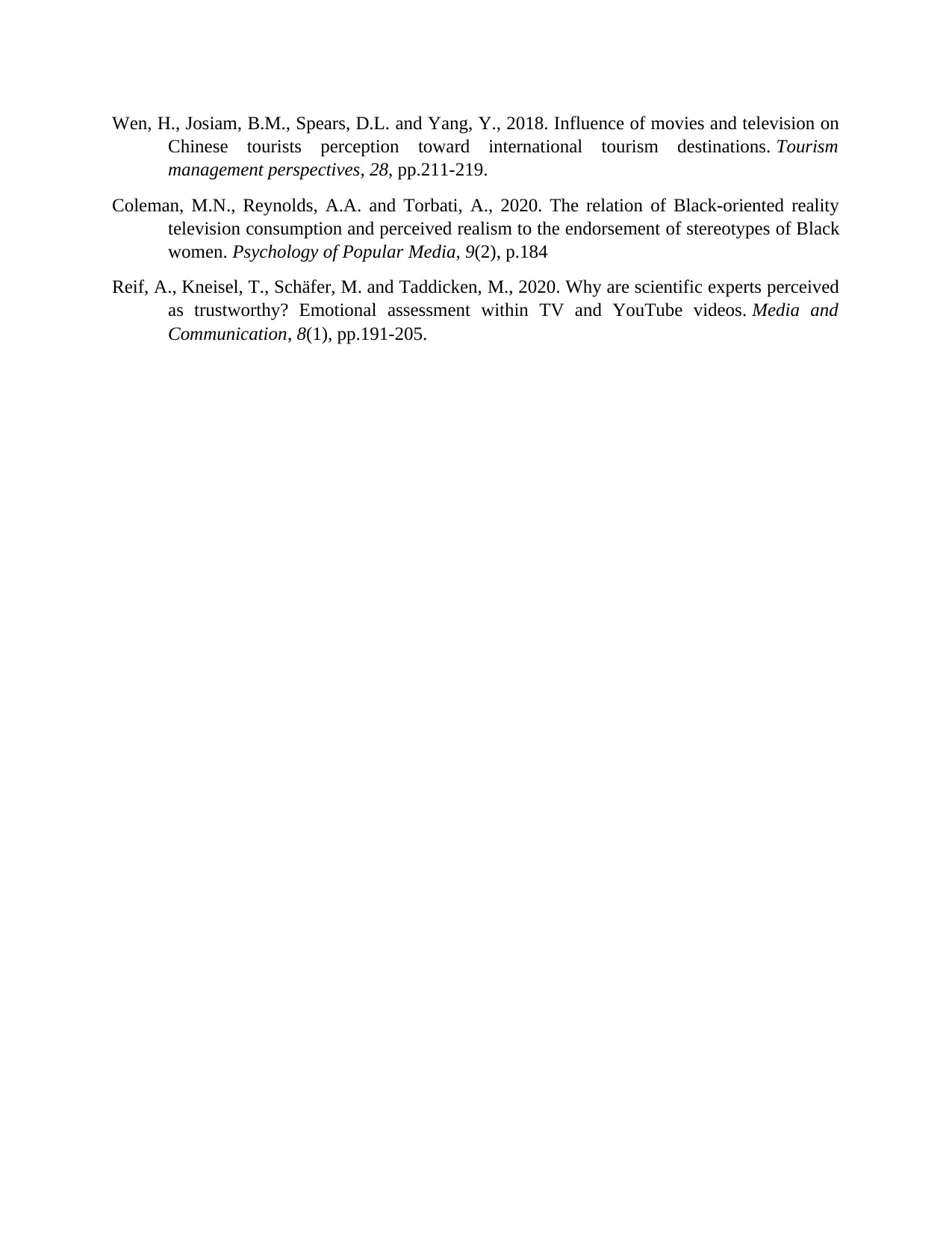
Wen, H., Josiam, B.M., Spears, D.L. and Yang, Y., 2018. Influence of movies and television on
Chinese tourists perception toward international tourism destinations. Tourism
management perspectives, 28, pp.211-219.
Coleman, M.N., Reynolds, A.A. and Torbati, A., 2020. The relation of Black-oriented reality
television consumption and perceived realism to the endorsement of stereotypes of Black
women. Psychology of Popular Media, 9(2), p.184
Reif, A., Kneisel, T., Schäfer, M. and Taddicken, M., 2020. Why are scientific experts perceived
as trustworthy? Emotional assessment within TV and YouTube videos. Media and
Communication, 8(1), pp.191-205.
Chinese tourists perception toward international tourism destinations. Tourism
management perspectives, 28, pp.211-219.
Coleman, M.N., Reynolds, A.A. and Torbati, A., 2020. The relation of Black-oriented reality
television consumption and perceived realism to the endorsement of stereotypes of Black
women. Psychology of Popular Media, 9(2), p.184
Reif, A., Kneisel, T., Schäfer, M. and Taddicken, M., 2020. Why are scientific experts perceived
as trustworthy? Emotional assessment within TV and YouTube videos. Media and
Communication, 8(1), pp.191-205.
You're viewing a preview
Unlock full access by subscribing today!
1 out of 6
Related Documents
Your All-in-One AI-Powered Toolkit for Academic Success.
+13062052269
info@desklib.com
Available 24*7 on WhatsApp / Email
![[object Object]](/_next/static/media/star-bottom.7253800d.svg)
Unlock your academic potential
© 2024 | Zucol Services PVT LTD | All rights reserved.





